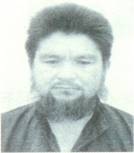Case study
Emeti Yakuf rose to prominence in the Chinese militant group, the East Turkestan Islamic Movement (ETIM). He was reportedly its third leader and for five years believed to be the second to be killed by US drones. ETIM was sheltering in Pakistan’s tribal belt while planning attacks on the Chinese state when CIA drones killed him in August 2012.
Many details of Yakuf’s life and allegiances are confused – not least because he operated under a variety of pseudonyms, including Abdul Shakoor Turkistani, Abdul Jabbar, Aibu Abudureheman (Abu Abdurehman), and Saifula (Saifullah). He also worked for a variety of groups, including Chinese Muslim separatists and core al Qaeda.
Yakuf was born in China on March 14 1965, according to a charge sheet released by Beijing in 2008, which also identified seven other senior ETIM members. Little is known about Yakuf’s early life, but according to the document released by Beijing, he left China in November 1996, travelling to ‘another South Asian country’ to train as a terrorist with ETIM.
The ETIM’s goal is to win independence from China of Xinjiang province, an area in the far west of the country with a majority Muslim population, with the goal of joining a broader Islamic state called East Turkistan.
The document offers a chronology of Yakuf’s next few years: by September 1998, it claims he was a ‘key member’ of ETIM, and from 2001, he was responsible for ‘recruiting new members, organizing terrorism training, as well as planning and carrying out terrorist attacks’ as acting ETIM military commander. He was said to have trained ‘dozens of extremists’ who were then sent to the Middle East and to western Asia.
In 2007, he allegedly ‘ordered ETIM members to enter Chinese territory’ to plot attacks at the Beijing Olympics.
The document adds that in 2008 ETIM released a video statement in which Yakuf, appearing under the pseudonym Saifullah, called for ‘holy war’ against the Beijing Olympic Games, threatening to attack Chinese and western politicians, athletes and spectators. In the video, he also claimed that ETIM had carried out attacks in Shanghai, Kunming and Guangdong.
An analysis by the Jamestown Foundation’s Militant Leadership Monitor reports that despite the Chinese government’s announcements, ETIM’s influence faded after the death of Hahsan Mahsum, a leader, in 2003. However, in around 2008 another group with similar goals, the Turkistan Islamic Party (TIP), emerged. Yakuf was also linked to this group. The analysis notes: ‘It remains unclear whether the Turkistan Islamic Party (TIP) is a continuation of the East Turkistan Islamic Movement (ETIM) or a different organization that shares the same objectives.’
In February 2010, Yakuf reportedly became head of the TIP and oversaw the group of Uzbek militants in North Waziristan, according to a later report in the Long War Journal, a security blog. This was after his predecessor, Abdul Haq al Turkistani, was reportedly killed in a drone strike near Mir Ali in North Waziristan on February 14 2010.
However it emerged in June 2015 that Abdul Haq may not have been killed by CIA drones. An ETIM-linked propaganda outlet reportedly said Abdul Haq had been severely injured in the February 2010 strike. It said he resumed his duties as the group’s leader in 2014. The Bureau has yet to confirm Abdul Haq survived the strike however it is feasible that if he had only been incapacitated, Yakuf could have stepped up to lead the group.
In April 2011, Yakuf had a major promotion, becoming commander of al Qaeda forces in Pakistan’s tribal belt. He succeeded the Egyptian commander Saif al-Adel, who left the region in April 2011 as a result of frequent drone strikes in the area, according to an allegedly Taliban-leaning paper, Karachi Islam, quoted by the Long War Journal. The Jamestown Foundation’s Militant Leadership Monitor attributes this rapid rise to Yakuf’s close friendship with Tahir Yuldashev [LINK], leader of the Islamic Movement of Uzbekistan, another separatist militant group sheltering in the region, as well as to the longstanding links between Yakuf’s predecessors in the TIP and Osama bin Laden.
Karachi Islam reported that Yakuf was running training camps at which Punjabi and European militants were given preference ‘for carrying out attacks in the West and the United States.”
In July 2011, the TIP carried out attacks in western China that left at least three dozen people dead, according to Associated Press. The following month, an individual claiming to be Abdul Shakoor (one of Yakuf’s pseudonyms) appeared in a video with his face obscured, taking responsibility for the killings.
In the following months, Yakuf released written and video statements criticising the Chinese government’s policies towards its Muslim citizens and urging militant action against them.
He said: ‘My brothers, without fighting the Chinese and with only talking they will not leave our land. The land they took over by using guns can only be taken back with guns… Whoever attacks you, you attack them back…The only way for us to get rid of this tyranny is to do the jihad ibadet [prayer].’
On August 24 2012, Yakuf was killed in a CIA drone strike in the village of Makai of Maki Ghar, North Waziristan.
Sources and Citations
Pakistan intelligence officials (Dawn); Bureau researcher, citing Pakistan intelligence and Taliban sources (Bureau); Pakistani officials and intelligence officials (Pakistan Today); reports (New York Times)
References


